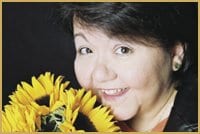In a lot of ways, musician Norine Braun is a non-conformist just by virtue of who she is. The East Vancouver-based singer/songwriter is working in an industry that likes its talent young, and prefers musicians who release records that tailor very specifically to one style of music.
Braun — by her own admission — is neither of those things.
“I was a late bloomer,” the singer laughs good-naturedly. “I always wrote songs, but it was in my bedroom with my tape recorder, for myself. In terms of my going into a studio, putting money behind it and trying to grow, that wasn’t until my early ’30s.
“I had a lot of people saying to me ‘Are you kidding? It’s too late! Most people your age are hanging up your instrument.’ I didn’t listen. I have to do what I have to do.”
Now — at the age of 45 — Braun has learned to be a music industry DIY-er, doing everything from making her website to independently releasing six of her own CDs and booking her own live shows.
Testament to her determination, she has just left a career of 17 years working in the field of mental health and addiction in order to concentrate even more on her career.
“It has been hard to focus on a job full-time and the music full-time,” the singer admits. “It just feels right; this is the time to just go for it. I don’t know if it is going to be viable, but I want to focus on my own muse 100 percent.”
Throughout the years, Braun’s music has varied stylistically about as much as one person can. Even on her new CD, Evolution of the Blood Star, the songs veer from bossa nova to trip-hop to straight ahead rock ‘n’ roll.
“I’m a songwriter first and I write what I’m feeling, rather than write a specific sound. I think people are sophisticated enough that they can listen to a whole bunch of different things,” she says.
Braun’s song topics have run the gamut of many different themes, inspired by everything from Ray Bradbury’s Fahrenheit 451 novel (“Conformity 451”) to watching a friend transition (“Rock and a Hard Place”) to sadomasochism (“Jenny”). She says the songwriting process helps her to work through different ideas.
“When I was writing ‘Jenny’ and coming up with lyrics like ‘I like Jenny when she’s down on all fours/But does Jenny like Jenny when she’s down on the floor’ I was thinking out loud about what is pornography, what is erotica, what is sadomasochism? Is it a true expression or a popular one, is our body sacred, is it profane? It was more an expression of my uncertainty of this and of where it comes from.”
As with most songwriters, the subject of love factors regularly in her music and, if her connection to her partner is any indication, she knows of which she sings. “Alice and I met 20 years ago; I was 25 and she was 28. We met through the classifieds; I never answered one and she had done it only once before. We’ve been living together 19 years. We’re soul mates, best friends and all that. I couldn’t imagine my life without her.”
Another topic that regularly surfaces in her music is spirituality, most notably in both the latest CD’s art and title song, Q (evolution of the blood star). Within the disc’s graphics, there is a painting on one panel featuring a crucified hand reaching up to a second hand coming down from the heavens.
“The song is about my own evolution and that picture to me is my — and humanity’s — reaching out for something greater than myself,” she explains. “There is certainly a Christian undertone to it; reaching to the Creator, to the Higher Power, being connected so that through my suffering, there is redemption.”
She admits that taking on such spiritual topics both in her music and her disc’s artwork is a bit of a dividing line for some of her potential fan base. “In terms of the lesbian community, Christianity is not a real big draw,” she half-laughs.
“As a whole, mainstream society is afraid to talk about spirituality,” she continues. “It is almost a dangerous thing to do, because people have strong feelings about it, and when you say you are ‘of’ something, people have presuppositions that [they] put on you.”
Still, she says she feels deeply embraced and supported by much of Vancouver’s queer community.
“I’ve been really supported by Vancouver Pride. This will be the third Pride that I’ve played,” she notes. “I’m playing East Side Pride, Picnic in the Park and Gay Day at Playland.”
She is also very much looking forward to the second annual Vancouver two-spirit gathering Embracing our Spirits, Jul 27-29, and speaks with great joy and respect of the two-spirited side of her life.
“There is a certain acceptance in the aboriginal community to be who you are, more so than most other communities,” she says. Her connection to her aboriginal roots has been a source of strength and support in exploring both her queer identity and her spirituality, she notes.
“Two-spirit to me is more of a spiritual path which encompasses sexuality, gender identity and roles. Certainly in the literature I’ve read, when a person became aware of that part of themselves, they were sent to the two-spirits in the community who would teach them and it was a celebrated and very sacred, powerful thing.
“It would be so nice if that was all so accepted,” she says wistfully, “to be what and how you are.”

 Why you can trust Xtra
Why you can trust Xtra


